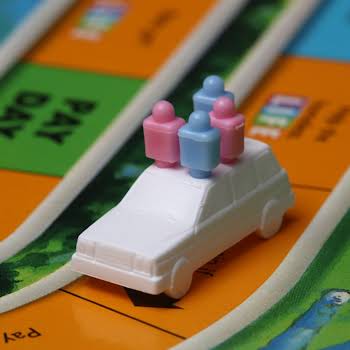
By IMAGE
25th Aug 2018
25th Aug 2018
You get your car serviced once year, you probably visit your GP and you either file an annual tax return or undergo a yearly review at work – but what about a parental audit? Chances are you’re already so overworked that guilt is a near constant companion – and one that keeps you from checking under the parent lid.
But what if you are actually already doing a good enough job, more than good enough? And what if, turning just 15 minutes of your usual day into play was all it took to assuage this guilt and be a better mum?
When you are a parent who also works outside of home you can be hard pushed to get through traffic to do childcare collections, get home, produce a dinner that’s somewhat healthy before it’s time to begin bedtime. Believe me, I understand that so, disclaimer time, this is not about giving you yet another thing to try and squeeze into your already packed day.
The 15-minute parenting system is about helping you to embed simple, creative and mindful play techniques into your existing routines that will result in less tears and more laughter for your parent-child relationship.
After two decades as a child psychotherapist, my parenting philosophy is simple: it’s about good enough being good enough. 15 minutes of mindful play a day is good enough because small changes can make big differences in your parent-child relationship.
Related: Having kids changes your friendships and that sucks
Power of play
Why? Children thrive on calm, clear and consistent parenting. They need us to be predictable and present. They need to be able to anticipate with, at least to some degree of certainty, how we will respond to their needs, wants and demands. All of this helps to build a foundation for safe, secure and healthy attachment between you and your child.
But how can 15 minutes of play each day achieve this?
Play is the language of children. It is how they understand this world and the people and experiences they have in it. By playing with your children in a meaningful way each day they experience a deep connection with you, you are speaking their language with them and in doing so they can feel felt, or get gotten by you.
When your child knows that you will be spending this time playing with them each day you will find that they are less likely to negatively act out seemingly demanding attention from you. What can look like attention-seeking behaviour is more often a need for connection with you.
Related: ‘You left your child unsupervised?’ The moral outrage of parenting in the age of fear
Here are 3 easy ways you can connect with your child:
– Fortune telling – take your child’s hand in yours and, using your index finger, trace along the lines on their palm telling them three positive things you can see about them. Perhaps point out their play line, their kind friend line and their love to laugh line and give examples of each.
– Bubble pop – blow some bubbles and invite your child to pop as many bubbles as they can. Then suggest they pop them using only their pointer finger, or their pinkie finger, then using their elbow/fists/nose/feet etc and keep changing it up.
– One of your own – take a game you used to love playing as a child yourself. It could be an active game, a clapping/song type game, or a quieter more focused game. What is important is you loved to do it. Tell them the story of when you used to play it. Play this game together. Children love to hear about when you were little.
Joanna Fortune is a psychotherapist working with children and families. Her Book 15-Minute Parenting: The Quick and Easy Way to Connect with your Child is published by Gill Books and is out now
























